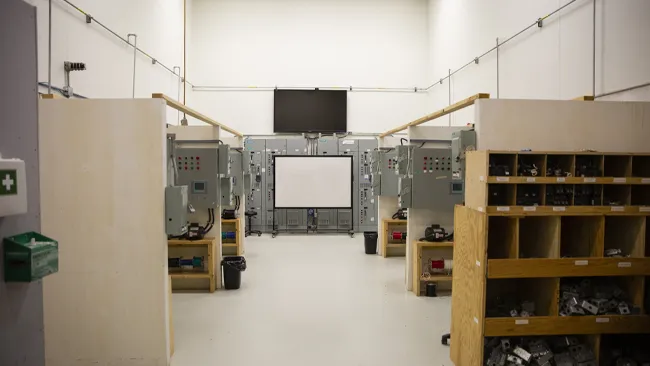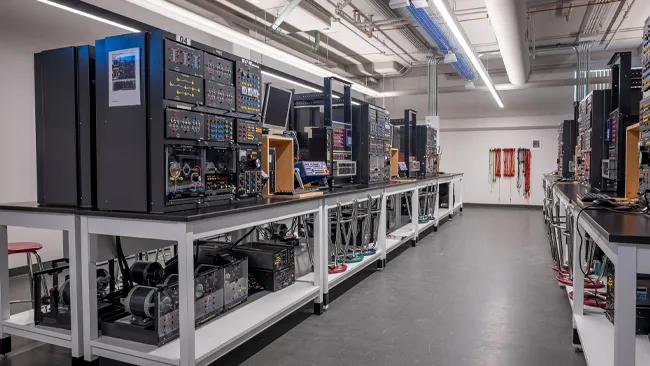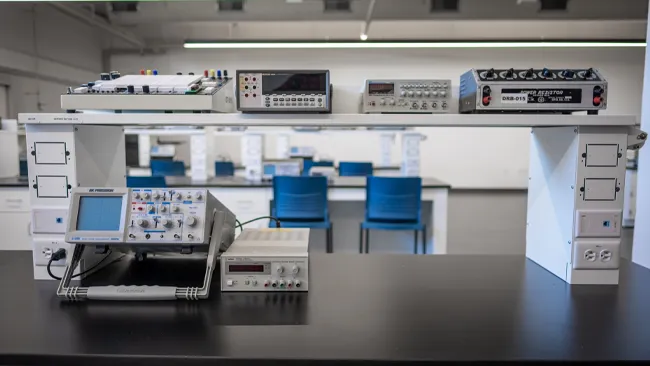
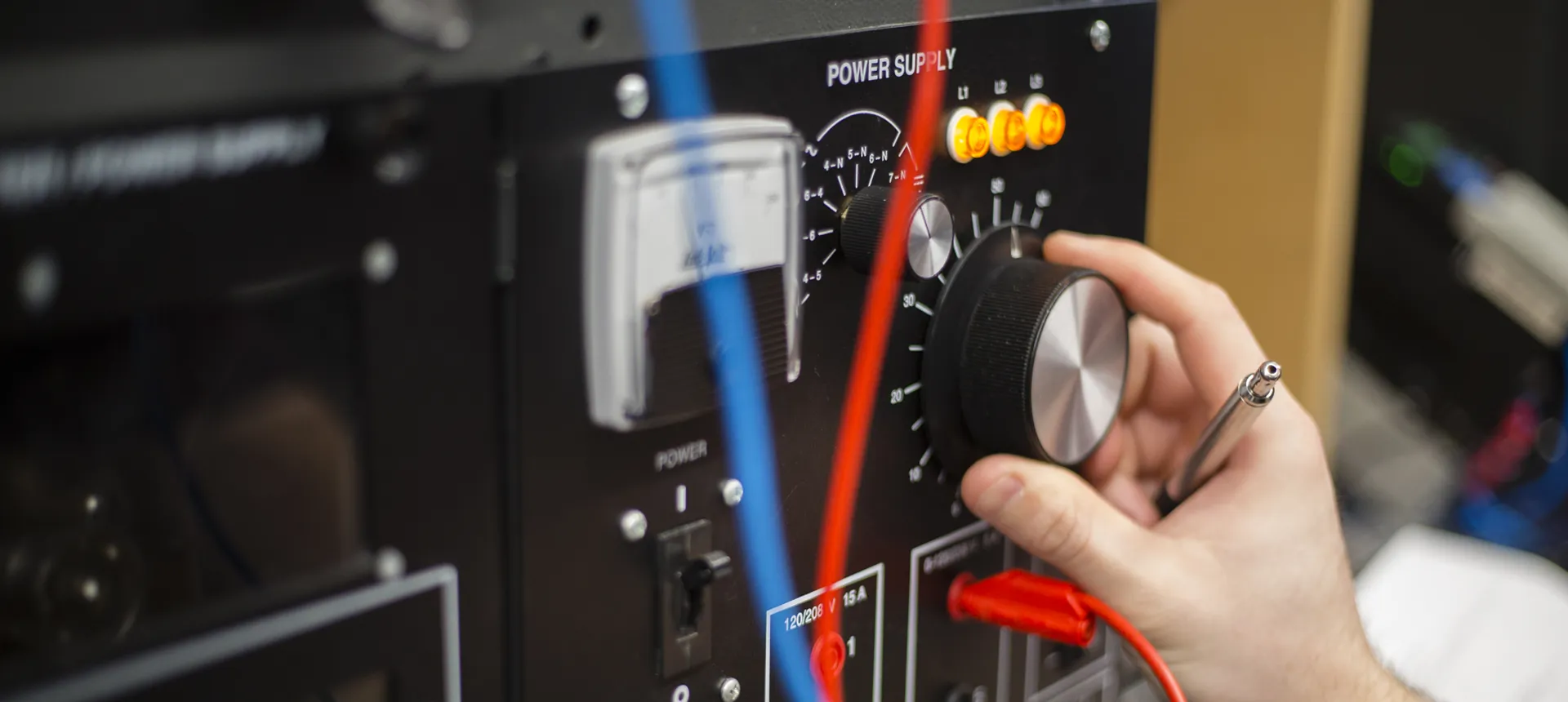
Electrical Techniques
CIP Code: 46.0302
Overview
Take on a role in the electrical field where there is plenty or job security and room to grow.
Working in the electrical career field requires a combination of technical knowledge, problem solving skills, and physical dexterity. The Lambton College Electrical Techniques program prepares students for this field and prepares students to begin their journey into apprenticeship.
Working both in the classroom and in various lab and shop settings, students gain practical, hands-on experience along with strong theoretical training in electrical fundamentals. The basics of Programmable Logic Controllers (PLCs) are taught and electrical safety is also covered through theory and hands-on labs.
Students learn how electricity and electrical devices work, how to use various electrical tools, how to wire residential, commercial, and industrial circuits, how to interpret electrical codes, and how electronics and instrumentation devices are used in today’s high tech world.
Women in Technology & Trades
Discover how Lambton College's Women in Technology & Trades (WiTT) group is empowering women to excel in technology and trades.
Visit our WiTT page for more information on mentorship opportunities, events, and resources designed to support your journey in these dynamic fields.
Learn More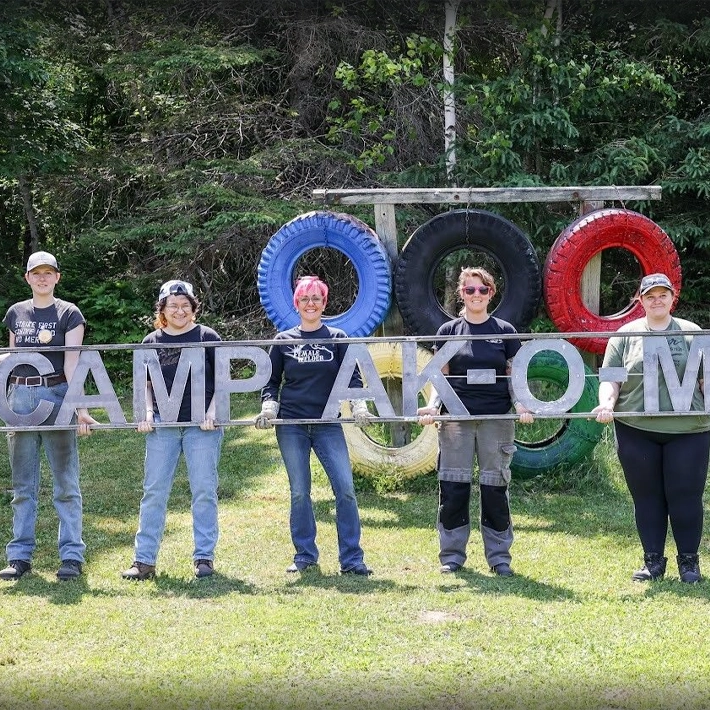
Admission Requirements
O.S.S.D. or equivalent with:
- Grade 12 English C or U
- Grade 12 Mathematics C or U
- Grade 11 or 12 Physics C or U (recommended)
Grade 12 Mathematics Requirement
Grade 12 Mathematics for College Technology or any grade 12U mathematics is recommended; Grade 12 Foundations for College Mathematics (MAP4C) minimum final grade is 60%. If the program is highly competitive, students with Grade 12 Mathematics for College Technology or any Grade 12U mathematics will be given preference.
The admissions process is competitive and meeting the minimum academic requirements does not guarantee admission.
Lambton College reserves the right to alter information including admission requirements and to cancel a program or course at any time; to change the program curriculum as necessary to meet current competencies or changes in the job market; to change the pathways to third-party certification bodies; or to withdraw an offer of admission both prior to and after its acceptance by an applicant or student because of insufficient applications or registrations or over-acceptance of offers of admission. In the event Lambton College exercises such a right, Lambton College's sole liability will be the return of monies paid by the applicant or student to Lambton College.English Language Requirements
Applicants must submit proof of English proficiency through one of the following in-person test methods:
- IELTS Academic: Overall score of 6.0
- TOEFL IBT: Overall score of 70
- PTE Academic: Overall score of 53
- CAEL: Overall score of 60
- CELPIP: CLB 7
- Lambton Institute of English Placement Test: Overall score of 70
- Completion of an English pathway program at a recognized partner school
Meeting the minimum English requirements does not guarantee admission. Students with higher English proficiency scores will receive priority in the admission assessment process. Not all students will qualify for EAP-3106 in place of the required IELTS or TOEFL test scores.
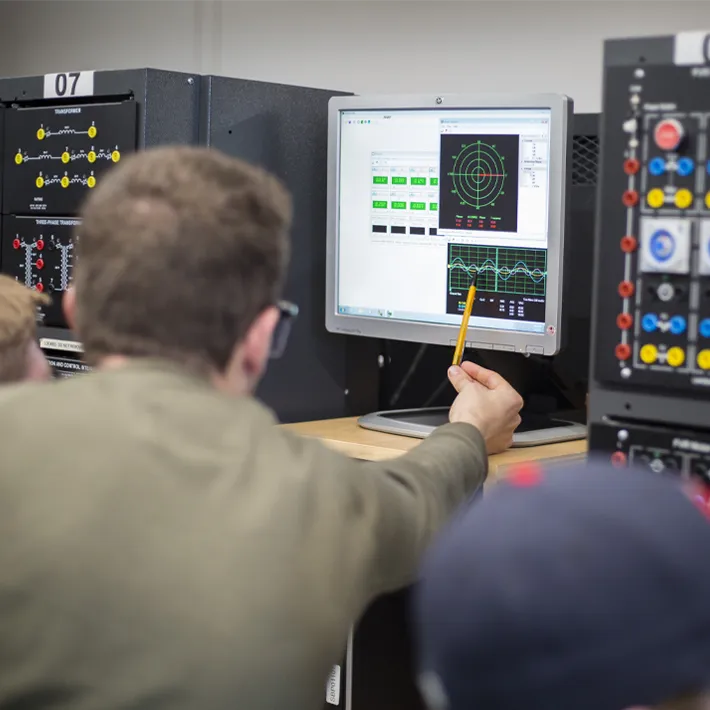
Pathways to Apprenticeship & Diplomas
Upon completing this program, students who gain an apprenticeship are eligible for an exemption fro the Basic Level of the in-school portion of the Construction Maintenance Electrician apprenticeship program.
Students can also continue on into the second year of the Electrical Power Distribution & Control Technician (PDCT) program which shares a common first year with ELTC. Students in Electrical Techniques must take MTH-1904 if they wish to continue on into the PDCT program.
Costs
- Term 1 $7,743.38
- Term 2 $6,953.08
Total Cost of Program
Tuition fees are estimates and are subject to change each academic year. Fees do not include books (unless specifically noted), supplies or living costs.
Lambton College reserves the right to alter information including admission requirements and to cancel at any time a program or course; to change the location and/or term in which a program or course is offered; to change the program curriculum as necessary to meet current competencies or changes in the job market; to change the pathways third-party certification bodies; or to withdraw an offer of admission both prior to and after its acceptance by an applicant or student because of insufficient applications or registrations or over-acceptance of offers of admission. In the event Lambton College exercises such a right, Lambton College’s sole liability will be the return of monies paid by the applicant or student to Lambton College.
Additional Fees
-
Safety Shoes$250.00
-
Safety Glasses$20.00
-
Calculator$25.00
-
Tagout Lock$20.00
-
Tool Kit*$325.00
*Tool Kit Includes
- Linesmen Pliers - High leverage 9" side cutting pliers
- Side Cutters
- Needle Nose Pliers
- Tongue and Groove Pliers
- Slot Screwdriver
- Terminating Slot Screwdriver - 2.5 mm - 3 mm width
- Philips Screwdriver - #2
- Two Robertson Screwdrivers - sizes red and green
- Measuring Tape
- Wire Strippers
- Knife - no utility knives allowed
- Torpedo Level - short 9" or so
- Claw Hammer
- Safety Lock
Important Dates, Deadline & Late Fees
For additional information on registration dates, deadlines and late fees please refer to Registration Dates and Deadlines.
Student Fees
A student services fee is included in your tuition.
Health Insurance Coverage
Emergency medical insurance is mandatory for all international students at Lambton College. This includes students who are full-time and part-time and who are on a co-op. This insurance is provided by GuardMe - a third party insurance provider.
See Insurance Costs & DetailsTechnology Requirements
In order to keep pace with the requirements of each and every course in your program, Lambton College requires that each student have access to a laptop while studying at our college.
Labs & Equipment
Courses
Basic Electrical Installations I
The student will develop a general knowledge of the operation of common hand and power tools; install common switching devices, outlets and enclosures, GFCI and AFCI circuits, as well as three and four way lighting circuits. All installations well be performed to the CEC and the student will correctly terminate conductors and demonstrate the application of non-metallic sheathed and armoured cable. The student will demonstrate the skills required to install a complete residential consumer's service. They will properly bend and install both EMT and Rigid conduit.
Electrical Theory
This course covers the explanation of the fundamentals of electrical theory, from the molecular structure of matter to the laws that govern the calculation of current, voltage and power in DC circuits. Topics will include the relationships between voltage, current, resistance and power including Ohm's and Kirchhoff's laws. Calculations will be made on series, parallel and combination circuits and current flow and power consumption in 2 and 3 wire systems. Circuits will be wired safely and measurements taken using digital multi-meters. As well, the course will include an introduction to alternating current AC.
Safety & Electrical Code I
This course will focus on the Canadian Electrical Code regulations and the application of those regulations as they pertain to electrical installations in residential dwellings as well as commercial units. The student will learn to navigate through the Canadian Electrical Code and interpret sections including Wiring Methods, Conductors, Installation of Electrical Equipment and Protection and Control.
Workplace Communications
This course focuses on skills required in any organization or position: writing business documents, responding to realistic scenarios, and speaking in an organized and vibrant manner. Students will practice professional and inclusive communications skills by producing, revising, and editing short business documents and engaging in verbal interactions and presentations.
Fundamentals of Instrumentation I
This is an introductory course in process instrumentation and safety. Topics will include WHIMS and an introduction to industrial hazards, Job Safety Analysis, and Work Permits. Basic instrumentation and control loop concepts, instrument signalling, wiring, and calibration techniques will be studied. Pressure measurement will be covered in greater detail. The reading and interpretation of Process and Instrumentation Diagrams will be addressed. The laboratory component will expose the student to the correct use and operation of calibration devices, pressure sensors and measuring instruments.
Mathematices for Electrical Circuits
This course reviews and develops topics in basic computation, measurement, algebra, geometry, trigonometry, and linear functions, emphasizing their electrical applications.
Electrical Systems Applications
This course is designed to extend the student's knowledge and experience into the areas of single-phase AC as well as DC systems. Resistive-reactive DC and AC circuits, power factor correction, DC motors and generators and single phase AC transformers are studied. Emphasis throughout the course is on problem solving. These concepts are supported and reinforced in the laboratory portion of the course.
Electronic Devices & Applications
This course covers an explanation of the fundamentals of electronics from digital logic to the operation of basic semiconductor devices in DC and AC circuits. Topics will include logic gates, Boolean algebra, flip-flops, P-N junction diodes, LEDs, transistors, thyristors, opto-couplers and operational amplifiers. The student will apply his/her knowledge of these devices in practical circuits such as dimmers, variable frequency drives and programmable logic controllers.
Industrial Installation Practices
In this course the student will gain the ability to read, interpret, and create electrical schematics related to motor control. The installation and operation of common controls used in industry including Stop-Start, Jog, Forward/Reverse, and speed control via variable frequency drives will become part of the student's skill set. An introduction to the wiring and programming of Programmable Logic Controllers will complete the student's industrial control knowledge. In addition students will gain the ability to interpret drawings and install conventional fire alarm system class A and class B circuits. Students will become familiar with different fire alarm devices along with their uses and operation.
Basic Programmable Logic Controllers
Upon successful completion, the apprentice will be able to describe the basic operation of a PLC including numbering systems, programming, and addressing requirements, as well as perform testing of PLC inputs and outputs. The student will also be able to demonstrate basic PLC programming including common relay instructions such as timers and counters to design programs to operate machines in a required manner using many of the internal functions of a PLC.
Code & Prints
Upon successful completion, the student will be able to navigate and apply sections of the Canadian Electrical Code (CEC) including determining code requirements and performing calcuations for a residential service, maximum circuit loading, and motor branch circuits. The student will also be able to interpret and use information provided from drawings, specifications and standards, as well as create drawings and schedules for residential electrical installation and maintenance.
General Education Elective
Contact
Centre for Global Engagement
LAMBTON COLLEGE SARNIA
1457 London Road
Sarnia ON N7S 6K4
After Graduation
Employment Opportunities

Our graduates have the skills to work in a variety of residential construction settings including renovation projects. They will also have the required skills to work in a warehouse or wholesale business in the electrical field. Job titles include: general labourer, construction and maintenance electrician apprentice, industrial electrician apprentice, trade contractor assistant, electrical technician, network cabling, fire alarm technician, related mechanical trades, independent contractor, service technician and warehouse and wholesale sales.
Looking for Support After Graduation?
The International Graduate Services & Support Centre (GSSC) is a place dedicated to assisting International alumni as they seek employment and settle into Canadian life following graduation.
Immigration Regulations & Changes
Immigration regulations are legislated by the Federal Government of Canada and are subject to change at any time without notice. Students are responsible for ensuring that they are in compliance with all Immigration, Refugees and Citizenship Canada regulations at all times during their studies and while in Canada. Lambton College staff are not authorized to provide advice or guidance on immigration-related matters. Prospective applicants and current students should consult the Immigration, Refugees and Citizenship Canada website or call the IRCC Call Centre at 1-888-242-2100 to answer or clarify any immigration-related questions or information.
More Information
Technology Requirements
It is recommended that students purchase a laptop with a Windows operating system.
Internet Speed Requirements
For best performance for students learning remotely, an internet connection with a minimum of 40 Mbps download and 10 Mbps upload speed is recommended in order to effectively use video conferencing and remote lecture delivery software as well as, other online resources remotely. Due to the large area over which students may be dispersed, we are unable to recommend a specific provider, so you will need to inquire around your area to find one that best suits your needs.
Minimum Laptop Requirements
In order to access the internet and virtually-delivered software and courseware, student laptops should include the following at a minimum. By meeting the following specifications, students will be equipped to access software and courseware on their laptop through the internet:
- Intel i5 8th Gen Processor or equivalent
- 16 GB of RAM (with a minimum of 8 GB)
- 100 GB HDD or more
- HD Graphics
- Webcam with a microphone
- Wireless 802.11n/ac 5ghz capable
- Windows Operating System (Windows 11)
Please note that Chromebooks and MacBooks may not support all software required for your program; students should verify compatibility with their professors.
Software
To ensure students are getting the most our of their classroom experience, some software will be required.
Lambton College has made this software easily accessible online. Students can leverage our Microsoft Office 365 software packages and services. In addition, much of the software you require for your courses will be available on demand for use on any device - on or off campus.
Student Responsibilities
- Course and program delivery schedules are proposed and subject to change for each intake.
- Students are required to bring their own laptop with wireless capability.
- Students are advised to bring an official copy of their most recent police clearance, driver's license, and vaccination record from their home country.
